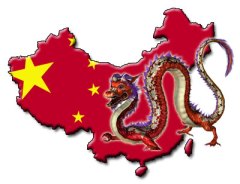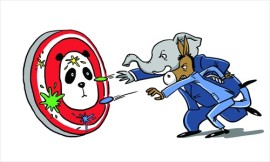by
Summary: The long-simmering trade conflicts with China have taken a turn for the worse. Romney’s foreign policy team contains some extreme hawks eager for some form of war with China. DoD, desperate for threats to justify its existence, has fired a propaganda barrage at us about the cyber-threat with China. And some national security agencies, having exhausted the specious domestic threat from jihadists, turn to China as the only game left to justify their jobs. The US might single-handed insure that peace does not reign in the 21st century.
Contents
- Cyber-threat inflation
- Brewing up a Trade War
- Looking ahead to the Romney doctrine
(1) Cyber-threat inflation
The context to these articles hyping China’s cyber capabilities is quite delusional. The US government draws on the world’s largest and most advanced pool of information technology talent, and has almost certainly far outspent any other nation on cyberwar (with so many agencies seeing this as a source of preeminence in the 21st century).
Here are some recent samples.
(a) “China’s cyberwar“, editorial in the Washington Post, 15 December 2011
(b) Occupying the Information High Ground: Chinese Capabilities for Computer Network Operations and Cyber Espionage, Prepared for the U.S.-China Economic and Security Review Commission by Northrop Grumman Corp, 7 March 2012 — Executive Summary:
.
The PLA’s sustained modernization effort over the past two decades has driven remarkable transformation within the force and put the creation of modern command, control, communications, computers, intelligence, surveillance, and reconnaissance (C4ISR) infrastructure at the heart of the PLA’s strategic guidelines for long term development. This priority on C4ISR systems modernization, has in turn been a catalyst for the development of an integrated information warfare (IW) capability capable of defending military and civilian networks while seizing control of an adversary’s information systems during a conflict.
Translation: like every great power, China intends to have a 21st century military force capable of defending itself. That includes cyberwarfare.
(c) Right-wing propaganda shops hype the threat:
- “US Headed For Cyberwar Showdown With China In 2012“, Loren Thompson (Lexington Institute;see Wikipedia), Forbes, 22 December 2011
- The Washington Free Beacon morphs the Northrop Grumman report into fantasy: “The Coming China Cyberwar“, 8 March 2012 — “China’s Military Is Prepared to Wage Large-Scale Cyberwarfare Attacks Against U.S. Military, Civilian Networks”
(2) Brewing up a Trade War
There are many grounds for trade conflicts between a hegemon and a rapidly rising rival. Certainly China, like America in its early years, plays the trade game to win — ignoring the rules where possible. But now the national security people have dealt themselves into the game. This might lead to significant escalation, as China’s national security people might rise to the challenge. That transforms the game from one about money — where compromise tends to rule so that business gets done — to one mixing pride and fear. Neither allowing easy compromise, both fueling hostility that feeds the military establishments of both sides.
(a) Long-standing history of concerns about security of Huawei equipment: see Wikipedia for the history, with links for more information.
(b) Investigative Report on the U.S. National Security Issues Posed by Chinese Telecommunications Companies Huawei and ZTE, House Intelligence Committee, 8 October 2012 — Conclusion of the Executive Summary:
In sum, the Committee finds that the companies failed to provide evidence that would satisfy any fair and full investigation. Although this alone does not prove wrongdoing, it factors into the Committee’s conclusions below. Further, this report contains a classified annex, which also adds to the Committee’s concerns about the risk to the United States. The investigation concludes that the risks associated with Huawei’s and ZTE’s provision of equipment to U.S. critical infrastructure could undermine core US national-security interests.
(c) As Saddam discovered, only God can provide the level of information the US government requires to prove innocence of a potential rival. See these two sensible rebuttals:
- “The Manchurian Network“, Farhad Manjoo, Slate, 11 October 2012 — “Don’t believe the U.S. government’s alarming claims that Chinese telecom firm Huawei is a danger to national security”
- “My Way Or the Huawei“, Trevor Timm, Foreign Policy, 12 October 2012 — “The U.S. government’s recent accusations against two Chinese companies are seriously overblown.”
- “US politicians’ hypocrisy“, Qi Li, op-ed in China Daily, 15 October 2012
(d) The US leans on its allies to work against our rivals
- “Huawei faces exclusion from planned Canada government network“, Reuters, 9 October 2012 — “Canada indicated strongly on Tuesday it would exclude Chinese telecom equipment giant Huawei Technologies Co Ltd from helping to build a secure Canadian government communications network because of possible security risks.” Rebuttal: “Huawei report heavy on rhetoric, light on substance“
- “Ex-diplomat says Sino-Japanese rift part of US agenda“, South China Morning Post, 16 October 2012 — “A former Japanese diplomat has accused the United States of manipulating Japan since the second world war in order to “eliminate” prime ministers who sought to develop better relations with Beijing.”
(3) Looking ahead to the Romney doctrine
The Romney doctrine appears to consist mostly of picking fights with as many nations as possible. It’s a commonplace strategy in history, although seldom successful. From the free e-book Believe In America: Mitt Romney’s Plan for Jobs and Economic Growth:
China presents a broad set of problems that cry out urgently for solutions. It is time to end the Obama administration’s acquiescence to the one-way arrangements the Chinese have come to enjoy. We need a fresh and fearless approach to that trade relationship. Our first priority must be to put on the table all unilateral actions within our power to ensure that the Chinese adhere to existing agreements. Anyone with business experience knows that you can succeed in a negotiation only if you are willing to walk away. If we want the Chinese to play by the rules, we must be willing to say “no more” to a relationship that too often benefits them and harms us.
http://fabiusmaximus.com/2012/10/15/china-trade-cyberwar-huawei-44076/


Δεν υπάρχουν σχόλια:
Δημοσίευση σχολίου